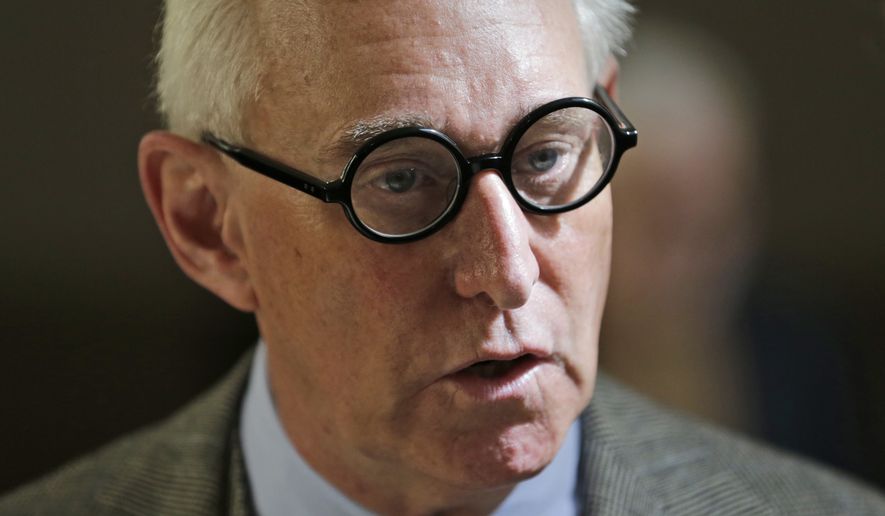President Trump’s former campaign adviser Roger Stone pushed back Monday against a yet-to-be-published report, preemptively denying allegations that he alerted then-candidate Trump in advance of WikiLeaks releasing emails stolen from the chairman of Democratic rival Hillary Clinton’s campaign.
“Somebody has been pushing a fake news story, first with The New York Times, then The Washington Post and now with Ronan Farrow of the New Yorker,” Mr. Stone, 66, said in a video he shared on social media. “Someone is saying that they overheard a conversation in which I told Donald Trump in October of 2016 what exactly would be in the WikiLeaks disclosures and when they would be disclosed.”
“This is categorically false. This is exactly the epitome of fake news. Let whoever is pushing this false narrative come forward and say it for the record with their name on it. They won’t because it is false,” Mr. Stone said in the video.
Expanding on his statement later Monday, Mr. Stone told New York Daily News that all three outlets have approached him about an alleged telephone conversation he supposedly had with Mr. Trump shortly before WikiLeaks began releasing the personal emails of John Podesta, Mrs. Clinton’s former campaign chairman.
“It is alleged that I called Donald Trump on Oct. 1 and that he put me on speaker phone [and] that the source overheard,” Mr. Stone told the newspaper, decrying the claim as “horse [expletive].”
“We don’t comment on pieces we haven’t published,” a New Yorker spokesperson said Tuesday.
“We don’t comment on stories that we may or may not be working on,” echoed a spokesperson for The New York Times.
A representative for The Washington Post said in an email that it was was unclear as to what story Mr. Stone was referring to.
Representatives for The Washington Post did not immediately return a message seeking comment.
WikiLeaks ultimately began publishing Mr. Podesta’s emails on Oct. 7, 2016, exposing the chairman’s personal correspondence and providing ammunition for Mr. Trump and his campaign’s supporters in the weeks before defeating Mrs. Clinton.
Mr. Podesta’s emails and a separate cache of internal Democratic National Committee correspondence released several weeks earlier were supplied to WikiLeaks after being sourced by Russian state-sponsored hackers, according to U.S. federal law enforcement and intelligence agencies.
Special counsel Robert Mueller is investigating both the DNC and Podesta hacks as part of his probe into the 2016 race, and several people interviewed by his office have previously said that authorities appeared particularly interested in Mr. Stone, a longtime confident of the president who served as an adviser to his campaign through 2015.
Mr. Stone previously claimed to be in contact with WikiLeaks publisher Julian Assange through an intermediary, and he correctly predicted the anti-secrecy website would release material damaging to the Clinton campaign days prior to the publication of Mr. Podesta’s stolen emails.
“It wouldn’t be an October surprise if I told you what it was, but I have reason to believe that it is devastating because people with political judgment who are aware of the subject matter tell me this. So right now, you see a terrible scrambling by the Clintonites to attempt to discredit Assange, to try to soften the blow,” Mr. Stone said during an interview with right-wing media personality Alex Jones aired on Oct. 2, 2016.
“I had no advanced notice of the content source or exact timing of the WikiLeaks disclosures including the allegedly hacked emails,” Mr. Stone said in a statement earlier this year. “I never received anything whatsoever from WikiLeaks, Julian Assange, anyone associated with them, or anyone else, including allegedly hacked emails, and passed them onto Donald Trump.”
• Andrew Blake can be reached at ablake@washingtontimes.com.




Please read our comment policy before commenting.